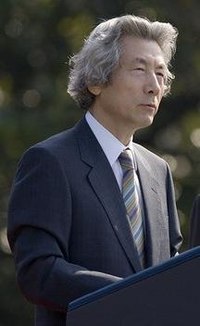Junichiro Koizumi
Junichiro Koizumi (小泉純一郎 Koizumi Jun'ichirō?, lahir 8 Januari 1942) Perdana Mentri Jepang manten.
Sanggeus jadi pingpinan Partéy Démokratik Liberal (PDL) taun 2001, Koizumi kawentar salaku ahli hukum réformasi, museurkeun kana hutang pamaréntah Jepang tur ngaswastakeun parusahaan pos. Taun 2005, Koizumi nu mingpin PDL meunang sora mayoritas di parlemén dina sajarah Jepang modéren. Sababaraha kritik nyababkeun goréngna hubungan jeung nagara tatangga nagara Asia saperti Cina jeung Koréa Kidul.
Kasang tukang
éditAwal kahirupan
éditKoizumi generasi katilu kulawarga politikus. Ramana, Junya Koizumi, direktur jenderal Departemen Pertahanan Jepang sareng anggota Diet. Akina, Matajiro Koizumi, Menteri Pos jeung Télékomunikasi jaman Perdana Menteri Hamaguchi sareng Wakatsuki sarta nu ngamimitian privatisasi parusahaan pos. Tempo: Koizumi family.
Lahir Yokosuka dina 8 Januari 1942, Koizumi namatkeun sakola di SMA Yokosuka High School jeung Universitas Keio, dina widang ekonomi. Koizumi kuliah di University College London saméméh mulang ka Jepang dina Agustus 1969 sanggeus ramana ngantunkeun. Koizumi milu daptar keur anggota majlis rendah dina pamilihan Desember; tapi teu menang sora nu cukup di Liberal Democratic Party (LDP). Taun 1970, Koizumi jadi sekretaris Takeo Fukuda, Menteri Keuangan harita nu jadi Perdana Menteri dina taun 1976.
Dina pamilihan umum Desember 1972, Koizumi kapilih jadi anggota Lower House di Distrik 11 Perfektur Kanagawa. Koizumi jeung Fukuda ngahiji di LDP. Ti harita, Koizumi kapilih 10 kali.
Nikah jeung cerai
éditKoizumi nikah dina umur 21 taun jeung mahasiswa Keio, Kayoko Miyamoto taun 1978, sanggeus ngalamar dina poé munggaran panggih (nu disiapkeun ku asisten politik Koizumi). Pestana di Tokyo Prince Hotel nu dihadiran leuwih ti 2,500 urang, kaasup Fukuda (Prime Minister), tur bentuk kue perkawinanna saperti Gedung Diet Nasional.[1]
 | Artikel ieu keur dikeureuyeuh, ditarjamahkeun tina basa Inggris. Bantuanna didagoan pikeun narjamahkeun. |
Kawijakan luar negeri
édit
Popularitas
édit
Dina mimiti pamaréntahanna, Koizumi pamimpin nu kawentar ku kajujuran kawijakanna nu jelas tur kahirupanna nu pinuh warna. Koizomi disebut "Lionheart", dumasar kana rambutna tur jiwana nu pinuh sumanget, jeung "Maverick".[2] Dina Juni 2001, 85 persen masyarakat Jepang satuju kana kawijakanna tur ngan 7 persen nu nolak.[3]
In January 2002, he sacked his popular but volatile Foreign Minister Makiko Tanaka, replacing her with Yoriko Kawaguchi. By April, following an economic slump and a series of LDP scandals that claimed the career of YKK member Koichi Kato, Koizumi's popularity rating had fallen 40 percentage points since his nomination as prime minister.[4]
However, Koizumi was re-elected in 2003 and his popularity surged as the economy recovered. His proposal to cut pension benefits as a move to fiscal reform, however, turned out to be highly unpopular. This restricted his administration's approval rating in the House of Councilors elections in 2004 to being only marginally better than the opposition Democratic Party of Japan (DPJ). In 2005, the House of Councilors rejected the contentious postal privatization bills. Koizumi previously made it cléar that he would dissolve the lower house if the bill failed to pass. The Democratic Party, while expressing support for the privatisation, made a tactical vote against the bill. Fifty-one LDP members also either voted against the bills or abstained.
On August 8, 2005, Koizumi, as promised, dissolved the House of Representatives and called for snap elections. He also expelled rebel LDP members for not supporting the bill. The LDP's chances for success were initially uncertain; the secretary general of New Komeito (a junior coalition partner with Koizumi's Liberal Democratic Party) said that his party would entertain forming a coalition government with the Democratic Party of Japan if the DPJ took a majority in the House of Representatives.[5]
However, Koizumi's popularity rose almost twenty points after he dissolved the House and expelled rebel LDP members, with opinion polls placing the government's approval ratings between 51 and 59 percent. The electorate saw the election in term of vote for or against the reform (privatisation), which Democratic Party and rebel LDP were seen as being against.
The elections on September 11 were the LDP's largest victory in decades, giving the party a large majority in the House of Representatives and nullifying opposing voices in the House of Councilors. In the following Diet session, the last to be held under Koizumi's government, the LDP passed 82 of its 91 proposed bills, including postal privatization.[6]
"Post-Koizumi"
éditKoizumi has announced that he will step down from office sometime in 2006, per LDP rules, and will not personally choose a successor as many LDP prime ministers have in the past. This has led to widespréad media speculation about who will be his successor, an issue popularly referred to as "post-Koizumi" (ポスト小泉 posuto-koizumi?).
The four léading candidates to replace Koizumi are Shinzo Abe, Yasuo Fukuda, Sadakazu Tanigaki, and Taro Aso. Faction léader Taro Kono has also expressed an interest in standing in the party elections. However, none of the five have officially declared their candidacies. Formal declarations are not expected until July 2006 at the éarliest.[7] In a June poll of 403 LDP lawmakers, Abe had the backing of 130, followed by Fukuda with 30.[8]
Kabinet Koizumi
édit | Artikel ieu mangrupa taratas, perlu disampurnakeun. Upami sadérék uninga langkung paos perkawis ieu, dihaturan kanggo ngalengkepan. |
- ↑ "Japan's Destroyer[tumbu nonaktif]," TIME, Sep. 10, 2001.
- ↑ Salah ngutip: Tag
<ref>tidak sah; tidak ditemukan teks untuk ref bernamaanderson - ↑ Koizumi's popularity hits fresh peak Archived 2013-04-04 di Wayback Machine, CNN.com, June 12, 2001.
- ↑ "Koizumi ally quits politics over scandal," BBC News, April 8, 2002.
- ↑ "New Komeito exec signals willingness to jump LDP ship," The Japan Times (registration required), July 28, 2005.
- ↑ Salah ngutip: Tag
<ref>tidak sah; tidak ditemukan teks untuk ref bernamajune06 - ↑ "July announcements eyed for LDP race," Daily Yomiuri, June 18, 2006.
- ↑ "Focus shifts to Koizumi's successor as Diet session nears end[tumbu nonaktif]," Mainichi Daily News, June 17, 2006.
